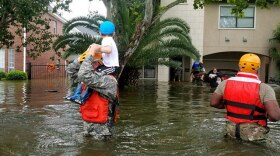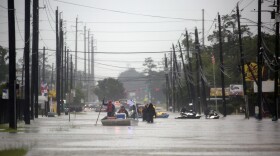Hurricane Harvey flooded homes, bakeries and grocery stores across Houston, forcing many Jewish families who keep kosher to survive on crackers from the corner store.
So North Texas kosher caterers took action, and set off for Houston bearing brisket and much more.
Kosher caterer hits the road
His mobile kitchen is clearly Chaim Goldfeder's pride and joy.
"We have refrigerators, we have a freezer here that actually still has some food in it from Houston. Another refrigerator, we have a hot box, we brought a second hot box with us just to keep things hot once they were cooked," he explains.
Goldfeder owns Texas Kosher BBQ, based in Dallas. The second the roads opened after the catastrophic flooding caused by Hurricane Harvey, he hauled his mobile kitchen down to Houston. The giant smoker on the back got a real workout.
"Six hundred pounds of brisket at a time," he says. "We do about 140 three-pound chickens at a time. And just to give you an idea, that will feed about 700 people."
Goldfeder says since many Jewish Houstonians were displaced and many of the kosher grocery stores in Houston were flooded, finding something to eat for families who keep kosher was exceptionally difficult. Many people, who had been living off Chex Mix from the convenience store, told Goldfeder that his roast beef and peach cobbler was the first actual meal they'd had in a week.
"I think the last thing people who've really lost everything need to worry about is where their next meal is coming from," he says.
Taking care of their own
The nonprofit Dallas Kosher mobilized — not just Goldfeder and his giant smoker, but two other North Texas caterers. At last count, they'd provided 30,000 free kosher meals to Houston storm victims. Rabbi Sholey Klein who works with the organization, says 10,000 more will arrive before the Jewish holiday of Sukkot.
For people who don't keep kosher, Klein runs through the basic requirements.
"Some of the famous ones are not mixing milk and meat products together," he says. "Thou shall not cook the calf in its mother's milk. So cheeseburger is off the menu for me. Never had one, never will."
Separating milk and meat isn't the end of it. Pork and shellfish are off limits and eating meat at all means finding some that's certified kosher. Klein says the animal needs to be slaughtered by a trained rabbi.
"You're always and only getting it from a special supplier, a special supermarket, a special production," he says.
And that's exactly what Houston was lacking, thanks to Hurricane Harvey's unrelenting rain and the record-setting flooding that followed. So Dallas Kosher jumped in, collecting holiday food, sending meals down to Houston in refrigerated trucks, and of course, cooking on the ground.
Klein says it wasn't difficult to get people to pitch in.
"They really, really did it for the Mitzvah. They did it for the good deed," he says.
The view from Houston

For folks in Houston, it was a welcome gesture.
"I call myself the Queen of Disasters because this is our fifth natural disaster," says Janice Jucker, who co-owns a kosher business in Houston called Three Brothers Bakery.
The main location took on several feet of water after Harvey. It was previously damaged by Tropical Storm Allison, Hurricane Ike and two other Houston floods. This latest storm forced a 17-day closure.
"This one, four and half feet; this was the most we've ever had and it was just devastating," she says.
Three Brothers Bakery was able to open in time for Rosh Hashanah, which started on Sept. 20, and sell the challah bread it's known for. But the store suffered about $1 million in damage. Jucker says that devastation is reflected throughout the neighborhood, and the city.
"You drive down the streets and street after street of debris, six, seven feet high. And it's people's lives and memories. It's like nothing you've ever seen. It's just debilitating," she says.
North Texas kosher caterers know they can't right rebuild people's lives. One thing they can do is make sure Jewish people have hot kosher food to feed their bodies and spirits. Chaim Goldfeder says he spent eight days cooking brisket and barbecue beans in Houston. He says it's a week he'll never forget.
"This gentlemen comes up to us and he's wearing a shirt, shorts and sandals," Goldfeder says. "And he said 'I want to tell you that everything I have, I'm wearing. I lost everything. This is everything I have left. And what you guys gave us wasn't just food, you gave us a lot of hope. And there's nothing we can do to repay that.'"
And there's no need. The bill's already been paid.










